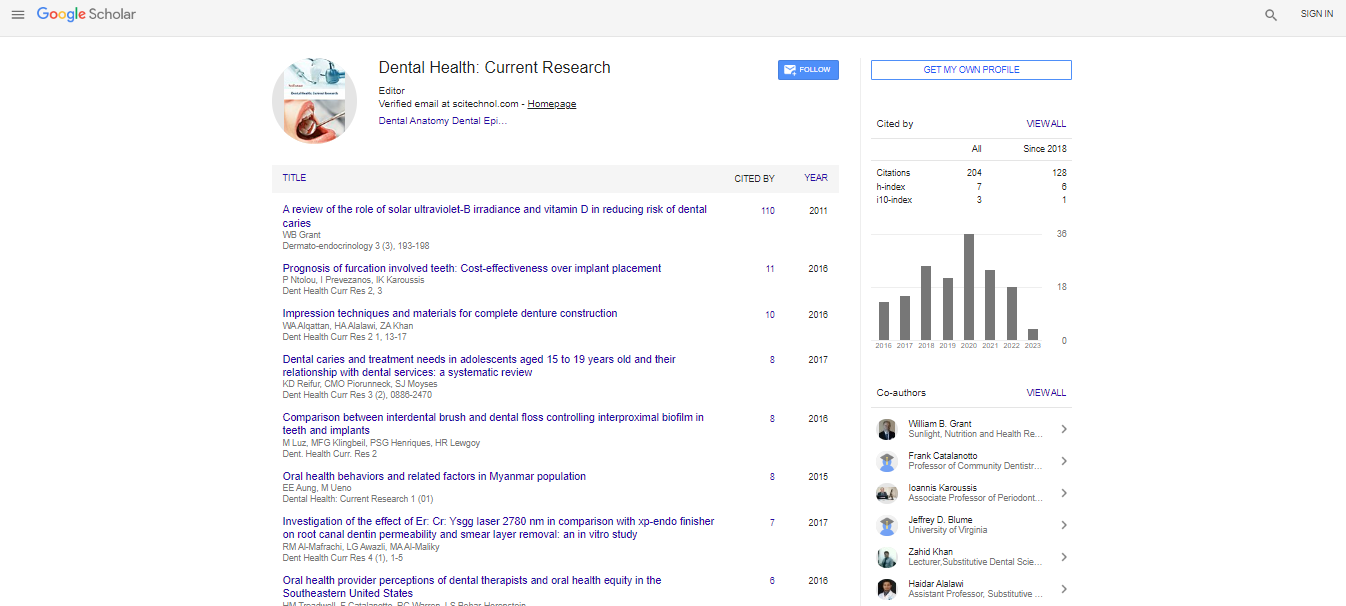Commentary, Dent Health Curr Res Vol: 10 Issue: 4
The Importance of Dental Hygiene: Best Practices for a Healthy Smile
Yukohima Shinada*
1Department of Dental Education Development, Tokyo Medical and Dental University, Tokyo, Japan
*Corresponding Author: Yukohima Shinada,
Department of Dental Education
Development, Tokyo Medical and Dental University, Tokyo, Japan
E-mail: yukoshi@456.jp
Received date: 22 July, 2024, Manuscript No. DHCR-24-147377;
Editor assigned date: 24 July, 2024, PreQC No. DHCR-24-147377 (PQ);
Reviewed date: 07 August, 2024, QC No. DHCR-24-147377;
Revised date: 14 August, 2024, Manuscript No. DHCR-24-147377 (R);
Published date: 21 August, 2024, DOI: 10.4172/2470-0886.1000223
Citation: Shinada Y (2024) The Importance of Dental Hygiene: Best Practices for a Healthy Smile. Dent Health Curr Res 10:4.
Description
Dental hygiene is the practice of keeping the mouth, teeth and gums clean and healthy to prevent disease. It is a critical component of overall health, as poor oral hygiene can lead to a variety of dental and medical problems, including cavities, gum disease and even heart disease. Good dental hygiene involves regular habits such as brushing, flossing and professional cleanings, as well as making informed choices about diet and lifestyle. This article looks into the importance of dental hygiene, the best practices for maintaining oral health and the potential consequences of neglecting dental care.
Dental hygiene plays an important role in maintaining overall health. The mouth is a gateway to the body and its condition can affect not just oral health, but also systemic health. Poor oral hygiene can lead to the accumulation of plaque, a sticky film of bacteria that forms on the teeth. Periodontitis can have far-reaching effects beyond the mouth. Studies have shown that the bacteria responsible for gum disease can enter the bloodstream and contribute to the development of heart disease, stroke, diabetes and respiratory diseases. Therefore, maintaining good dental hygiene is not just about keeping teeth clean; it’s also about protecting overall health.
Brushing teeth twice a day is a fundamental practice in dental hygiene. Using a fluoride toothpaste and a soft-bristled toothbrush, individuals should brush for at least two minutes each time, ensuring that all surfaces of the teeth are cleaned. Flossing is often overlooked, but it is a necessary part of dental hygiene. While brushing cleans the surfaces of the teeth, flossing removes plaque and food particles from between the teeth and under the gumline, areas that a toothbrush cannot reach. Regular flossing can prevent cavities and gum disease by keeping these areas clean. For those who find traditional floss difficult to use, there are alternatives such as floss picks, interdental brushes and water flossers, which can make the process easier and more effective.
Professional dental cleanings and check-ups are necessary for maintaining oral health. Dentists and dental hygienists can remove tartar build up, which cannot be removed by brushing and flossing alone. They can also identify early signs of dental problems, such as cavities or gum disease and provide treatments before these issues become more severe. Regular dental visits, typically every six months, are recommended to keep the mouth healthy and to catch any potential issues early.
Diet plays a significant role in dental hygiene. A diet high in sugars and starches provides food for the bacteria that cause tooth decay. Reducing the intake of sugary snacks and drinks can help prevent cavities. Foods that promote good oral health include dairy products, which are rich in calcium and help strengthen teeth; crunchy fruits and vegetables, which stimulate saliva production and help clean teeth; and water, which helps wash away food particles and bacteria.
Fluoride is a mineral that strengthens the enamel, making teeth more resistant to decay. It is naturally found in water and is also added to many toothpastes and mouthwashes. Using fluoride toothpaste and drinking fluoridated water can significantly reduce the risk of cavities. For individuals at higher risk of tooth decay, dentists may recommend additional fluoride treatments, such as gels, varnishes, or fluoride supplements.
Neglecting dental hygiene can lead to a range of oral health problems, some of which can have serious consequences. The most common issue is dental caries (cavities), which occur when plaque acids erode the enamel and create holes in the teeth. Untreated cavities can lead to pain, infection and eventually tooth loss. Gum disease is another consequence of poor dental hygiene. Gingivitis, the early stage of gum disease, is characterized by red, swollen gums that may bleed during brushing or flossing. If left untreated, gingivitis can progress to periodontitis, which can result in gum recession, bone loss and tooth loss.
Conclusion
Dental hygiene is a critical aspect of maintaining overall health and well-being. By following best practices such as regular brushing and flossing, using fluoride, maintaining a healthy diet and visiting the dentist regularly, individuals can prevent the most common dental problems, including cavities and gum disease. Neglecting dental hygiene can lead to serious oral and systemic health issues, making it necessary to prioritize good oral care as part of a healthy lifestyle. With proper attention to dental hygiene, everyone can enjoy a healthy, confident smile for life.
 Spanish
Spanish  Chinese
Chinese  Russian
Russian  German
German  French
French  Japanese
Japanese  Portuguese
Portuguese  Hindi
Hindi 